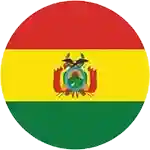Bolivia
-- Plurinational State of Bolivia --
Bolivia , officially known as the Plurinational State of Bolivia is a landlocked country located in central South America. It is bordered by Brazil to the north and east, Paraguay and Argentina to the south, Chile to the southwest, and Peru to the west. Bolivia is a democratic republic that is divided into nine departments. Its geography is varied from the peaks of the Andes in the West, to the Eastern Lowlands, situated within the Amazon Basin. It is a developing country, with a Medium Human Development Index score, and a poverty level of 53%. Its main economic activities include agriculture, forestry, fishing, mining, and manufacturing goods such as textiles, clothing, refined metals, and refined petroleum. Bolivia is very wealthy in minerals, especially tin. The Bolivian population, estimated at 10 million. The main language spoken is Spanish, although the Guarani, Aymara and Quechua languages are also common, and all four, as well as 34 other indigenous languages, are official. The large number of different cultures within Bolivia has contributed greatly to a wide diversity in fields such as art, cuisine, literature, and music.
-- Economy --
Bolivia’s estimated 2012 gross domestic product (GDP) totaled $27.43 billion at official exchange rate and $56.14 billion at purchasing power parity. Economic growth was estimated to be at about 5.2%, and inflation was estimated at about 6.9%. Bolivia was rated "Repressed" by the 2010 Index of Economic Freedom. Despite a series of mostly political setbacks, between 2006 and 2009 the Morales administration has spurred growth higher than at any point in the preceding 30 years. The growth was accompanied by a moderate decrease in inequality. A surplus budget of 1.7% (GDP) was obtained by 2012, the government runs surpluses since Morales administration reflecting a prudent economic management. Bolivia has the second largest natural gas reserves in South America.[72] The government has a long-term sales agreement to sell natural gas to Brazil through 2019. The government held a binding referendum in 2005 on the Hydrocarbon Law. The US Geological Service estimates that Bolivia has 5.4 million cubic tonnes of lithium, which represent 50%–70% of world reserves. However, to mine for it would involve disturbing the country's salt flats (called Salar de Uyuni), an important natural feature which boosts tourism in the region. The government does not want to destroy this unique natural landscape to meet the rising world demand for lithium.[73] On the other hand, sustainable extraction of Li is attempted by the government. This project is carried out by the public company "Recursos Evaporíticos" subsidiary of COMIBOL. The income from tourism has become increasingly important. Bolivia's tourist industry has grown gradually since about 1990.
-- Politics --
Bolivia has been governed by democratically elected governments since 1982, when a long string of military coups came to an end. Presidents Hernán Siles Zuazo (1982–85) and Víctor Paz Estenssoro (1985–89) began a tradition of ceding power peacefully which has continued, although two presidents have stepped down in the face of popular protests: Gonzalo Sánchez de Lozada in 2003 and Carlos Mesa in 2005.
-- Trade in Bolivia --
Major exports of Bolivia : Petroleum gases (39%), Zinc ores (13%), Precious metal ores and concentrates (6%), Unwrought tin (5%), Soybean oilcake (5%)
Major imports of Bolivia : Petroleum oils, refined (19%), Cars (7%), Motor vehicles for transporting goods (4%), Wheat or meslin flour (3%), Automatic data processing machines (3%)
Major trade partners of Bolivia (Exports) : Brazil (35%), United States (10%), Argentina (7%), Japan (7%), Venezuela (5%)
Major trade partners of Bolivia (Imports) : Chile (33%), Argentina (27%), Venezuela (12%), United States (9%), Brazil (8%)


